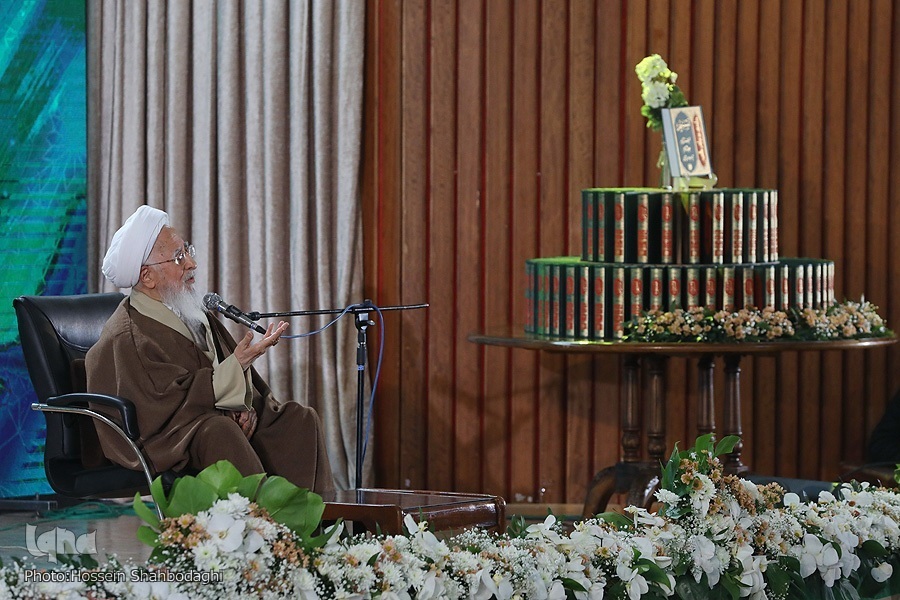Four Decades, Four Generations: Ayatollah Javadi Amoli Says Tasnim Exegesis Product of Seminary

The prominent Iranian scholar and Shia Marja made the statement while addressing an international conference held at Dar al-Shifa Seminary in Qom on Monday to unveil the 80-volume Tasnim interpretation of the Quran.
He emphasized that the Tasnim Exegesis is a product of the Islamic seminary, stating, "Without a doubt, this work belongs to the seminary, and I am merely one individual among this great scholarly community."
Recalling his early years in the seminary, Ayatollah Javadi Amoli noted, "Seventy years ago, when I entered the seminary, I had the privilege of studying under Ayatollah Boroujerdi, Imam Khomeini, and Ayatollah Mohaqqiq Damad. Ayatollah Mohaqqiq Damad was not only my teacher but also a father figure to me. Every Wednesday afternoon, I would present my notes on the lessons of 'Asfar' to him, and he would meticulously review and correct them. One day, after a session on 'Asfar,' I suddenly felt compelled to start teaching exegesis, which was met with enthusiasm from scholars and students."
Watch:
He further elaborated on the extensive efforts behind the Tasnim Exegesis, explaining, "Over four decades, spanning four generations, this course has examined various critiques and scholarly debates, naturally leading to some repetition. The fact that this exegesis comprises 80 volumes, each containing 800 pages, is a testament to the strength and depth of seminary scholarship."
Elsewhere, Ayatollah Javadi Amoli emphasized that while scholars are tasked with dispelling ignorance and educating people, turning the ignorant into the learned is only part of the mission.
Read More:
"The real challenge lies in nurturing wisdom and justice. Seminaries and universities may educate individuals, but truly wise and just individuals remain scarce—those who neither go astray nor obstruct the path of others. Ignorance has the potential to undermine both knowledge and reason. As narrated, 'Many a scholar has been destroyed by their own ignorance.' Pride, arrogance, and ignorance are what lead to the downfall of knowledge."
He elaborated that attaining wisdom requires practical intellect rather than mere theoretical knowledge. "The Quran affirms that some people have certainty about the truth yet still act against it. Those striving to eliminate ignorance must address the meaning of the Quranic verse: 'And they rejected them, while their souls were convinced thereof, out of injustice and haughtiness. So see how was the end of the corrupters' (Quran 27:14). This is a task for the seminary, though its success is relative."
Read More:
He pointed out the distinction between different forms of knowledge: "While seminaries and universities advance through the Quranic principle of ‘Nafar’ (seeking knowledge), the statement that 'Scholars are the heirs of the prophets' implies a higher goal. This means striving to be true spiritual heirs of the Prophet. This is not achieved solely through academic pursuit but requires spiritual purification. There is a fundamental difference between acquired knowledge and inherited knowledge. Miracles, for example, do not belong to academic disciplines but rather to spiritual purity and sanctity."
Tribute to Sayyed Hassan Nasrallah
In another part of his speech, Ayatollah Javadi Amoli praised Sayyed Hassan Nasrallah, the late Secretary-General of Hezbollah, noting that he had studied in Qom and attended his exegesis sessions.
"The Quranic verses he cited in his speeches were learned in these classes. When I visited Lebanon, he showed great respect, circling around me as a sign of gratitude for his teacher. If this leader has made an impact on the world, it is due to the blessings of the Quran. He lived by the Quran, alongside the Ahl al-Bayt, embodying sacrifice and devotion."
Nasrallah was laid to rest in Beirut on Sunday after a historic funeral procession. He was assassinated in an Israeli airstrike late last year.
The Tasnim Exegesis is a comprehensive and scholarly interpretation of the Holy Quran, authored by Ayatollah Javadi Amoli. Spanning 80 volumes, it is regarded as one of the most extensive modern exegeses in the Islamic world.
Read More:
The work incorporates classical and contemporary methodologies, integrating linguistic, philosophical, theological, and mystical perspectives.
The exegesis is known for its systematic approach to Quranic interpretation, emphasizing rationality, spirituality, and jurisprudential insights.
The work follows the “Quran by Quran” exegesis method, analyzing selected verses in four stages: a summary of the interpretation, a detailed exegesis, insights and subtleties, and a hadith-based discussion.



